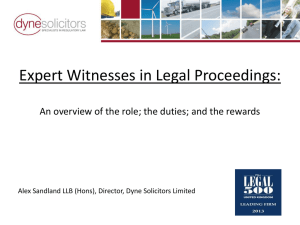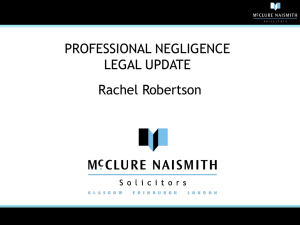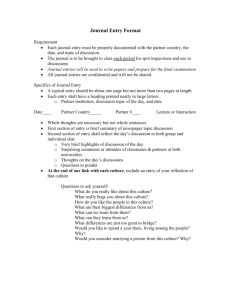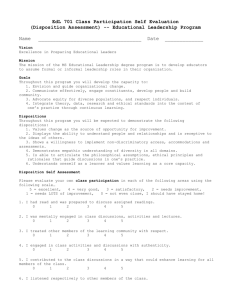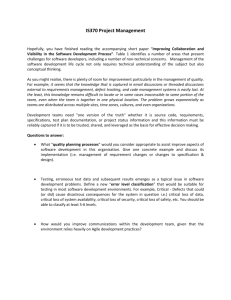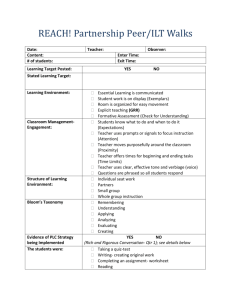Expert Evidence
advertisement
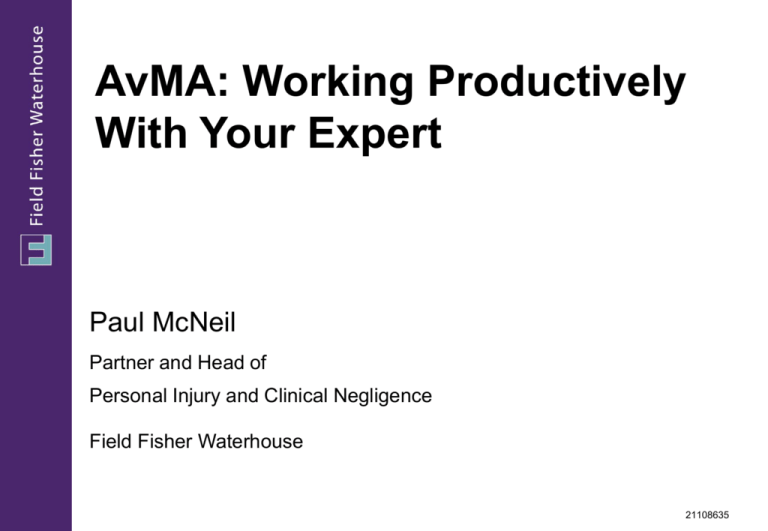
AvMA: Working Productively With Your Expert Paul McNeil Partner and Head of Personal Injury and Clinical Negligence Field Fisher Waterhouse 21108635 Contents 1. The Need for Expert Evidence 2. Restricting and Controlling Expert Evidence 3. Independence of Experts 4. Duty of Expert 5. Instructions to Experts 6. Meeting the Experts 7. Special Protection to Experts? (1) 8. Special Protection to Experts? (2) 9. Experts’ Fees 10. Privileged Expert’s Reports 11. Team Approach with Experts 12. Range of Opinion 13. Form and Content of Experts’ Reports 14. Declaration of Truth 15. Contents of Liability Reports 16. Amendments to Experts’ Reports 17. Numbers and Disciplines of Experts 18. Scientific, Medical and Technical Literature 19. Questions to Experts 20. Expert-Shopping 21. Expert Discussions (1) 22. Expert Discussions (2) 23. 10 Tips to make Experts’ Meetings Successful 24. Expert Meetings Cont’d 25. Experts’ Discussions – do they work? 26. Professional Responsibilities 27. Expert’s Withdrawal from the Case 28. Single Joint Experts (1) 29. Single Joint Experts (2) 30. Single Joint Experts (3) 31. Permission to rely on expert evidence late in the proceedings 32. Experts at Trial 33. Conclusion 1. The Need for Expert Evidence The function of the court is to decide on fact and to apply the law. Expert evidence of opinion frequently involves the process of inferring from the facts to assist in the court that first function. The difficulty is that the courts have traditionally excluded opinion evidence from the process lest the ‘expert’ usurp the role of the judge in deciding fact and law. Nevertheless the necessity and its solution is potentially resolved by s 3(1) of the Civil Evidence Act 1972, which states: ‘Subject to any rules of Court made in pursuance of this Act, where a person is called as a witness in any civil proceedings, his opinion on any relevant matter on which he is qualified to give expert evidence shall be admissible in evidence.’ 2. Restricting and Controlling Expert Evidence Lord Woolf criticized the development of ‘A large litigation support industry, generating a multi-million pound fee income …’, which meant that ‘Many potential litigants do not even start litigation because of the advice they are given about costs’, which he described as: ‘as great a social ill as the actual cost of pursuing litigation’. By litigation support he was concerned with the expert witness industry. His aim was to: • encourage the use of experts to narrow rather than multiply issues in dispute; • reduce the delay and expense resulting from the use of experts; and • ensure the parties and the court reduce to a minimum the inconvenience caused to experts in the conduct of their professional life by having to give evidence. 3. Independence of Experts The Woolf Reforms proposed to: • • distinguish between the fact-finding and the opinion-giving roles of experts; increase the independence of experts and to reduce their adversarial role by the parties; Until the publication of the CPR, the duties and responsibilities of experts were uncodified and had developed at common law in a piecemeal way, no less since the introduction of the Civil Evidence Act 1972. Training in the writing of reports and the giving of evidence was virtually unknown in the United Kingdom prior to 1996. As a result, the duties and responsibilities of experts were disparate and in practice often ignored. The CPR now codifies the extent of the expert’s duties to the court once proceedings have begun (see Carlson v Townsend [2001] EWCA Civ 511). 4. Duty of the Expert • • • • • • To those instructing him before proceedings have started To the Court once proceedings have begun Note “range of opinion” No longer immunity from action Order for costs against expert witness Contempt of Court See Practice Direction CPR 35 - Expert Evidence – General Requirements 2.1 Expert evidence should be the independent product of the expert uninfluenced by the pressures of litigation. 2.2. Experts should assist the court by providing objective, unbiased opinions on matters within their expertise, and should not assume the role of an advocate 2.3 Experts should consider all material facts, including those which might detract from their opinions. 2.4 Experts should make it clear: (a) when a question or issue falls outside their expertise; and (b) when they are not able to reach a definite opinion, for example because they have insufficient information 5. Instructions to the Expert • Legal Professional Privilege • Terms of Instruction • What are the tools for instructing an expert in a Clinical Negligence claim? • • • • • • • Chronology Ordered and paginated bundle of medical records Client’s witness statement Hospital Protocols Hospital Investigation File Any admission or specific denials Litigation and treating experts 6. Meeting the Experts In virtually every clinical negligence case it is essential to meet the core expert(s) (and if more than one the experts together) where the costs allow. The reasons are: • • • • • team approach ensures success or proper evaluation of cases where the advice is not to proceed face to face is often the best way to inter-communicate properly the legal, factual and medical issues discussion leads to better understanding and encourages ideas, arguments and clarification Allows the lawyers to “test” the experts and assess their attributes and qualities likely to be shown at expert meetings and in court Enables the client (who should also be present) to share the information, understand the issues and make her own assessment. It is impossible to say how often these expert’s meetings should take place because it depends on the complexity of the case. 7. Special Protection to Experts? Jones v Kaney [2011] UKSC13 • • • • • • K had been instructed to prepare an expert report in relation to a claim by J for damages sustained in a RTA. K’s initial report suggested a diagnosis of PTSD. An expert appointed for the defence concluded that J was exaggerating his symptoms. A joint statement was ordered which was very damaging to J’s case. It transpired that K had signed the joint statement without comment or amendment. As a result the matter settled for a much smaller sum. J issued proceedings for negligence against the expert and K’s defence was a plea of witness immunity in accordance with the decision in Stanton v Callaghan [2000]. The Court held that:There was no longer any scope for contrasting the duty owed by an expert to his client with a different duty to the court. In common with the advocate there was no conflict between the two. All who provided professional services which involved a duty of care were at risk of being sued for that breach of duty. They customarily insured against that risk. A witness of integrity faced with having to change his view would do so whether or not he was able to be sued. A lesson could be learnt from the position of advocates. Removal of their immunity had not resulted in any diminution of their readiness to perform their duty to the court. Immunity from suit should be abolished. Such conclusion did not extend to the absolute privilege that experts enjoyed in respect of claims for defamation. 8. Special Protection to Experts? (2) Contempt of Court In Phillips1 the Judge ordered that there be an inquiry into the expert’s conduct in the case, in particular to establish whether or not the evidence he gave was in ‘flagrant breach of his duties’. Experts did not need a specific warning as to the risks as to costs. The risk was self-evident from CPR r 32.14 which applies to all experts as well as lay witnesses and states: “Proceedings for contempt of court may be brought against a person if he makes, or causes to be made, a false statement in a document verified by a statement of truth without an honest belief in its truth.” So the expert’s declaration which is a mandatory requirement to conclude an expert report indicates that the expert could be the subject of contempt proceedings and also for perjury.(Perjury cannot be prosecuted for an expression of opinion). 1 Phillips v. Symes (2) [2004] EWCA Civ 2330 9. Experts’ Fees • You get what you pay for • You get what you don’t pay for • LSC funding • “No Win, No Fee” • Legal Expenses Insurance • Capped fees (CPR 35.4) • Cancellation fees (Martin v Holland & Barrett, 19.10.2002 QBD) 10. Privilege from disclosure of some Experts’ Reports The Court of Appeal in Jackson v Marley Davenport Ltd [2004] ECWA Civ/225 considered whether the Claimants could withhold from disclosure an expert’s preliminary report made in preparation of his final report and Longmore LJ stated: “There can be no doubt that, if an expert makes a report for the purposes of a party's legal advisers being able to give legal advice to their client, or for discussion in a conference of a party’s legal advisers, such a report is the subject matter of litigation privilege at the time it is made. It has come into existence for the purposes of litigation. It is common for drafts of expert reports to be circulated among a party’s advisers before a final report is prepared for exchange with the other side. Such initial reports are privileged. I cannot believe that the Civil Procedure Rules were intended to override that privilege.” 11. Team Approach with Experts Protocol for the Instruction of Experts 2005 (amended October 2009) “15.2 Experts should not be asked to, and should not, amend, expand or alter any parts of reports in a manner which distorts their true opinion, but may be invited to amend or expand their reports to ensure accuracy, internal consistency, completeness and relevance to the issues and clarity. Although experts should generally follow recommendations of solicitors with regard to the form of reports, they should form their own independent views as to the opinions and contents expressed in their reports and exclude any suggestions which do not accord with their views.” 12. Range of Opinion In a mechanism to attempt to overcome the “hired gun” approach, para 3.2(6) of PD 35 requires an expert to consider not just his own view, but: “Where there is a range of opinion on the matters dealt with in the report – (a) summarise the range of opinion; and (b) give reasons for his own opinion” Also para 2.3 of the PD that ‘An expert should consider all the material facts, including those which might detract from his opinion’. 13. Form and Content of Experts’ Reports • Addressed to the Court (once proceedings have begun) • Expert CVs (qualifications) • Material instructions (see PD 35 para 5) • Factual matrix (within own knowledge) • Range of opinion • Opinion (reasons, summary of conclusions and qualification of opinion) • Literature in support (or against) 14. Declaration of Truth An expert’s report must be verified by a statement of truth in the following form: “I confirm that I have made clear which facts and matters referred to in this report are within my own knowledge and which are not. Those that are within my own knowledge I confirm to be true. The opinions I have expressed represent my true and complete professional opinions on the matters to which they refer.” (CPR 22 deals with statements of truth. Rule 32.14 sets out the consequences of verifying a document containing a false statement without an honest belief in its truth). Part 35 PD, para 3.3 See contempt of Court 15. Contents of Liability Reports • • • • • • • • • • An objective and forensic reconstruction of the events using the factual witness testimony, the documents, and other material which are available to the expert. The methodology utilized and in particular whether any tests were performed, if so, by whom and under whose instruction. An explanation of the technical, scientific, or medical terms used in the report. A conclusion based on the balance of probabilities. The expert is permitted to say that one factual scenario is to be preferred on technical evidence. In medical negligence cases, an opinion on whether or not the clinician has acted or failed to act in accordance with the responsible standards. Here the expert should consider each possible omission or commission and give reasons for his opinion. Where an omission, such as the failure to perform a particular task (prevalent in medical and professional negligence cases), the report must set out, on a hypothetical basis what would have happened, on the balance of probabilities, but for the omission. Reference to the published (and if necessary unpublished) technical, scientific, and medical material in support of the expert’s opinions with copies annexed to the report. A view as to whether in relation to the key issues, the result has been to cause or materially contribute to the alleged loss. Any qualification that an issue in the case that falls outside the expert’s expertise. A summary of any missing information or material that is or may be important to the case. 16. Amendment to Experts’ Reports • Independence of Experts • Duty to Court • Permissible: Protocol for Instruction of Experts (para 15) In the modern practice of litigation, it is almost inconceivable that an expert’s report will be suitable for disclosure after the first treatment. It is inevitable that whenever an expert is instructed and the report written, the lawyer will wish to seek a clarification. This may be prompted to avoid opposing Counsel doing so pursuant to the provisions of CPR r 35.6 which allows written questions to be put to the expert for such purpose. Indeed, the Court by this very provision and by decisions stretching from Whitehouse v. Jordan to Jackson v. Marley Davenport Ltd have condoned the practice. Experts need not be embarrassed; it is a fact of litigation life. 16. Amendments to Experts’ Reports Cont’d Nevertheless, the Courts have also been at considerable pains to emphasise that over-ambitious lawyers should not be permitted to direct the expert away from his overriding duty to the Court (objective and impartial) towards the much condemned status of the (partisan) ‘hired gun’. Therefore, amendments are allowable, with strict guidance. Protocol for Instruction of Experts “15.1 It may become necessary for experts to amend their reports: (a) as a result of an exchange of questions and answers; (b) following agreements reached at meetings between experts; or (c) where further evidence or documentation is disclosed 15.4 Where experts significantly alter their opinion, as a result of new evidence or because evidence on which they relied has become unreliable, or for any other reason, they should amend their reports to reflect that fact. Amended reports should include reasons for amendments. In such circumstances those instructing experts should inform other parties as soon as possible of any change of opinion.” 17. Numbers and Disciplines of Experts CPR 35.1 states that: “Expert evidence shall be restricted to that which is reasonably required to resolve the proceedings.” For example, the value of property, motor vehicles, the cost of nursing care, and earnings have all been determined on readily available publications rather than expert evidence. The court has recently held that expert evidence was not needed from an accountant on the meaning and interpretation of standard accountancy documents. (See E.S v Chesterfield [2003] EWCA Civ 1284) 18. Scientific, Medical and Technical Literature The more supportive the published material, the more likely it is that the expert’s view will be convincing to the Court (and to the opposition). Prudent lawyers also ask their experts to provide a list of published material which does not support the case, in readiness for the opponent’s assault. DN v. London Borough of Greenwich [2004] EWCA Civ 1659 “Where an expert refers to research evidence in his report, he must identify it in the report, so that it will be available to be considered by the other side without delay, and not merely 4 days before the trial starts.” 19. Questions to Experts • See CPR 35.6 “Must be for the purpose only for clarification of the Report” • • • Can be joint experts or the opponent’s experts Once only and within 28 days of service If questions not answered, the Court may order that the instructing party may not rely on the report or may not recover his fees in the proceedings. 20. Expert-Shopping In Beck v Ministry of Defence [2003] Civ 1043 the Court of Appeal considered: “Whether it can ever be appropriate to allow a party to substitute one expert for another, without at some stage at least, being required to disclose the first expert’s report.” Expert shopping is to be discouraged and the check against possible abuse is to require disclosure of the abandoned report as a condition to try again. Also see Edwards-Tubb v JD Wetherspoon CA 25 February [2011] EWCA Civ 136 • Before issuing a personal injuries suit the Claimant instructed an orthopaedic surgeon whose identity was disclosed in a pre-action letter. After issue of proceedings he relied upon a report from a different orthopaedic surgeon. • E contended that whilst a party might require permission to change from one court-permitted expert to another in the same discipline that requirement was limited to a change of expert which took place after the issue of proceedings. 20. Expert-Shopping (cont’d) The Court held:• It was clear from r.35.2 that Pt 35 was concerned with experts who were instructed to report “for the purposes of proceedings.” That created a distinction between an expert instructed to advise a party privately and one who was instructed to produce a report for the purpose of proceedings. However, there was no difference of principle between a change of expert instructed, for the same purposes, post-issue. That was so as: (a) a party had exactly the same privilege in an expert report which he had obtained whenever he obtained it; (b) conversely, the damaging features of expert shopping were exactly the same whether it was undertaken before or after issue; (c) the whole ethos of personal injuries litigation since the introduction of the CPR and its associated protocols was to expect of litigators and parties an equivalent level of openness and communication before and after issue. Whatever the reason for subsequent disenchantment with an expert first instructed might be, once a party had embarked on the pre-action protocol procedure of cooperation in the selection of experts, there was no justification for not disclosing a report obtained from an expert who had been put forward as suitable, and had reported. • Accordingly, the discretionary power (afforded by CPR 35.4) to impose a condition of disclosure of an earlier expert report was available where the change of expert occurred pre-issue as when it occurred post-issue. The power should be exercised after the parties had engaged openly in the pre-action protocol. 21. Expert Discussions (1) • Standard Form of Directions in Clinical Negligence Cases • Lawyers Present ? • Agenda for Experts meeting Paragraph 18.5 of the Protocol for the Instruction of Experts advises that: “The parties, their lawyers and experts should co-operate to produce the agenda for any discussion between experts, although primary responsibility for preparation of the agenda should normally lie with the parties’ solicitors.” 22. Expert Discussions (2) Minutes of Meeting CPR r 35.12(3) permits the court to direct that:“Following a discussion between the experts they must prepare a statement for the court…” The Protocol goes further (para 18.10) and states that:“18.10 At the conclusion of any discussion between experts, a statement should be prepared setting out: (a) a list of issues that have been agreed, including, in each instance, the basis of agreement; (b) a list of issues that have not been agreed, including, in each instance, the basis of disagreement; (c) a list of any further issues that have arisen that were not included in the original agenda for discussion; (d) a record of further action, if any, to be taken or recommended, including as appropriate the holding of further discussions between experts” 23. 10 Tips to make Experts’ Discussions successful (1) Review:• Statements of Case • Witness Evidence • Exchanged Reports • Attached Literature 23. 10 Tips to make Experts’ Discussions successful (2) Do not allow a discussion without an agenda and insist on expert helping to prepare the agenda. N.B: Suggested MDCN 1state:“Unless otherwise agreed by all parties solicitors, after consulting with the experts, a draft agenda in the form of questions capable, as far as possible, of being answered “yes” or “no” shall be prepared jointly by the Claimants Solicitors and experts and sent to the Defendants Solicitors for comment at least 35 days before the agreed date for experts discussions”. 1Model Directions in Clinical Negligence cases 23. 10 Tips to make Experts’ Discussions successful (3) Follow the rules! • Ask closed questions • Chronological list of issues • Factual scenarios • Law on breach of duty • Law on causation • Reasonableness on quantum of damages • End of discussion 23. 10 Tips to make Experts’ Discussions successful (4) Ensure that both sides experts have all the relevant documents at the discussion:- • Records • Statements of Case • Experts Reports:Own discipline Other disciplines • Relevant correspondence from the lawyers 23. 10 Tips to make Experts’ Discussions successful (5) Send expert e-mail copy of the agenda before the discussion. 23. 10 Tips to make Experts’ Discussions successful (6) Advise expert not be afraid to: • stick to her guns • concede where appropriate • say “I don’t know – I need to undertake further investigations” 23. 10 Tips to make Experts’ Discussions successful (7) What if the expert changes her mind? N.B: Suggested MDCN state: “If an expert radically alters his or her opinion the joint statement should include a note or addendum by that expert explaining the change of opinion”. See also Temple v South Manchester Health Authority(2002) EWCA Civ 1406 and expert protocol. 23. 10 Tips to make Experts’ Discussions successful (8) Keep the lawyers away! • “Access to Justice” • Clinical Dispute Forum Guidelines • Protocol for Instruction of Experts • Suggested MDCN: “Unless otherwise ordered by the Court, or unless agreed by all parties, including the experts, the parties solicitors shall not attend such discussions, if solicitors do attend, the experts may if they so request, hold a part of their discussion in the absence of the solicitors.” 23. 10 Tips to make Experts’ Discussions successful (9.) Don’t tell the expert what to say except not to comment on matters outside expertise. N.B: Suggested MDCN state: “Experts give their own opinions to assist the court and attend discussions on the basis that they have full authority to sign the joint statement. The Experts should not require the authorisation of a solicitor or Counsel before signing the joint statement” Both the Clinical Dispute Guidelines and the Protocol for the Instruction of Experts state that those instructing Experts must not give, and experts must not accept, instructions not to reach an agreement on discussions on areas within the competence of experts 23. 10 Tips to make Experts’ Discussions successful (10) Ensure that the experts follow the instructions at the end of the discussion Example Agenda as follows: “Conclusion of discussion” • At the conclusion of the discussion, a statement must be prepared setting out: (a) a list of the agreed answers to the questions in the agenda; (b) a list of the questions which have not been agreed. • Where possible a summary of the reasons for non-agreement 23. 10 Tips to make Experts’ Discussions successful • Individual copies of the statement must be signed by all the experts before leaving any face to face meeting • Before the conclusion of a discussion at a distance identical statements setting out all the information required in paragraph 1 above must be prepared and signed by each Expert. Unaltered, signed copies must be exchanged immediately. • The Experts’ duty is to the Court and those instructing Experts must not give, and no Expert should accept instructions not to agree any item on the agenda. 24. Expert Meetings Cont’d • Woolf Warning Experts not to be instructed either not to agree or to refer back any points of agreement for ratification because:“This subverts the judge’s intention in directing the experts to meet, because the decision as to what to agree becomes a matter for the lawyers rather than the experts…” [Access to Justice] 25. Experts’ Discussions – do they work? • Cases settled? • Issues narrowed? • Costs increase? 26. Professional Responsibilities Duty of Lawyers • Statements of Case • Timetable for Trial • Details of Court and Interlocutory judge • Payment of fees on time • Check the report 27. Expert’s Withdrawal from the Case The position is summarised in para 10.1 of the Protocol for the Instruction of Experts: “Where experts’ instructions remain incompatible with their duties, whether through incompleteness, a conflict between their duty to the Court and their instructions, or for any other substantial and significant reason, they may consider withdrawing from the case. However, experts should not withdraw without first discussing the position fully with those who instruct them and considering carefully whether it would be more appropriate to make a written request with directions from the Court. If experts do withdraw, they must give formal written notice to those instructing them.” 28. Single Joint Experts (1) MP v. Mid Kent Healthcare NHS Trust [2001] EWCA Civ 1703 “When, if at all, should one party, without the consent of the other party, be permitted to have sole access to a single joint expert, ie an expert instructed and retained by both parties? In common with my Lord, I believe that the answer to this question must be unequivocal “Never”. Not merely is there nothing in CPR Part 35, the Practice Direction supplementing Part 35, and the relevant Queen’s Bench guide suggesting that such access should be permitted, but the implications of the rules are all the other way: see particularly rules 35.6 and 35.8, para 32 (Lord Justice Simon Brown)” and Edwards v Bruce [2009] EWCH 2979 (QB) Where a defendant’s solicitors had communicated in secret with joint expert without the claimant’s consent, the independence of the expert’s evidence had been tainted and the claimant was therefore entitled to rely on fresh expert evidence. In this case Mr Justice Coulson said: “In addition to the obligations owed to the parties, a single joint expert owes an overriding duty to the court to give advice on the issues, independent of the interests of the parties. He is in a position of considerable importance. Absent any legal issues, in a dispute like this, his opinions and conclusions might be determinative of the case as a whole. He can no more have communications with just one party about the substance of his report, in the absence of the other side, than a judge can have a conversation on the telephone with one party, and not the other, about the strengths and weaknesses of that party’s case, p.25” 29. Single Joint Experts (2) In Daniels v. Walker [2000] 1WLR 1382, the Court allowed the Defendant to instruct a care expert after the Court had ordered a joint expert and she had reportedly (unfavourably to the Defendant). It was noted: “In a substantial case, the correct approach is to regard the instruction of an expert jointly as the first step in obtaining evidence on a particular issue. It is to be hoped that, in the majority of cases it will not only be the first step but the last step. If having obtained a joint expert’s report, a party, for reasons which are not fanciful wishes to obtain further information before making a decision as to whether or not there is a particular part (or indeed the whole) of the expert’s report which he or she may wish to challenge, then they should, subject to the discretion of the Court, be permitted to obtain such evidence.” (per Lord Woolf MR at page 1387D). In less serious cases, the Court might take a more vigorous approach. 30. Single Joint Experts (3) In Kay V West Midlands SHA Queen’s Bench Division District Registry (Birmingham) 4 July [2007] which was unreported the court held where an agreed joint expert had been instructed and had prepared an uncontested report on the provision of assistive technology for a claimant suffering from cerebral palsy, an application for permission to adduce evidence from a different expert witness was refused as there were no exceptional circumstances justifying the new evidence. The Court applied the following principles: • in real and major disputes each party should have its own evidence from the outset. • otherwise joint experts should be agreed/ordered. • once a joint expert has been ordered strong presumption that this will suffice. 30. Single Joint Experts (3) cont. • the mere fact that large sums on the evidence does not justify a departure from this principle. • there is discretion for the Court to overcome the above. • the Court will consider overall justice to the parties and “This includes … the balance of grievance test. The application will only succeed in circumstances which are seen to be exceptional and to justify such a departure from the norm” (p.38 Judge Alistair MacDuff) 31. Permission to rely on fresh expert evidence late in the proceedings In cases where one party seeks permission, late in the day, to rely on fresh expert evidence, the relevant guidance is that set out by Neuberger J (as he then was) in Cosgrove v. Pattison [2001] CP Rep 68 said the following factors ought to be considered: • the nature of the issue or issues; • the number of issues between the parties; • the reason the new expert is wanted; • the amount at stake, and if it is not purely money, the nature of the issues at stake and their importance; • the effect of permitting one party to call further expert evidence on the conduct of the trial; • the delay, if any, in making the application; • any delay that the instructing and calling of the new expert will cause; • any other special features of the case; and • the overall justice to the parties in the context of the litigation. 32. Experts at Trial The relationship between the report and all testimony. As Lord Bridge said in Wilsher v Essex Area Health Authority [1987]: “Where expert witnesses are radically at issue about complex technical questions within their own field and they are examined and cross-examined at length about their conflicting theories, I believe that the judge’s advantage in seeing them and hearing them is scarcely less important than for when he has to resolve some conflict of primary fact between lay witnesses in purely mundane matters.” Smith v Southampton University Hospital NHS Trust [2007] was a clinical negligence claim against two surgeons that was dismissed, in which there was a substantial amount of agreement between the two experts. The Court of Appeal held that the trial judge had failed to explain why she had rejected the evidence on one expert, and that it was not sufficient to say that the other expert was highly reputable and representative of a responsible body of medical opinion. In Pride Valley Foods Ltd v Hall and Partners TCC, unrep, the judge was very critical of an expert witness in a construction case whose report was more than 200 pages in length, and which included opinions on issues outside his expertise, “his report offends the established basis on which an expert should give evidence”. 33. Conclusion “Broadly speaking, civil litigation has remained adversarial, with the expert witnesses – at any rate historically – appearing to be as partisan as their lay clients and legal representatives. The sobriquet of ‘hired gun’ until recently, was not inapt, although efforts have been made over the years, culminating in the Woolf reforms of 1999, to mitigate and, so far as possible, even remove the stigma of partisanship. Does the problem still exist today? I think the answer must, at any rate to some extent, be yes, because it seems to me to be inevitable. It is inevitable because it is human nature.” Conclusion Cont’d I am open to persuasion that I am wrong about this, but it does seem to me that there is at least a serious risk that a person who is asked to express an opinion by a party or prospective party to litigation, however honest and however hard he or she tries to be entirely objective, will or may trim his or his opinion to meet the interests of the client, at any rate in the grey areas which experience suggests exists in almost every case.” The Right Honourable Sir Anthony Clarke Master of the Rolls in foreward to “Experts in the Civil Courts”
